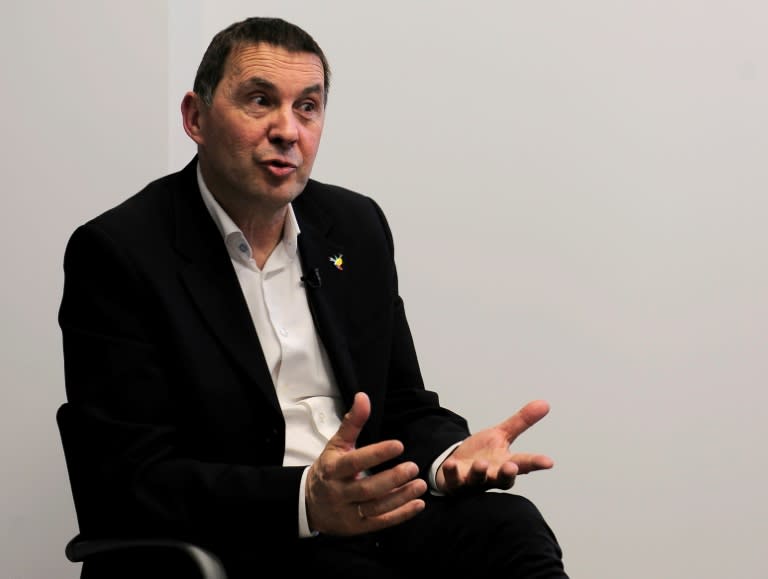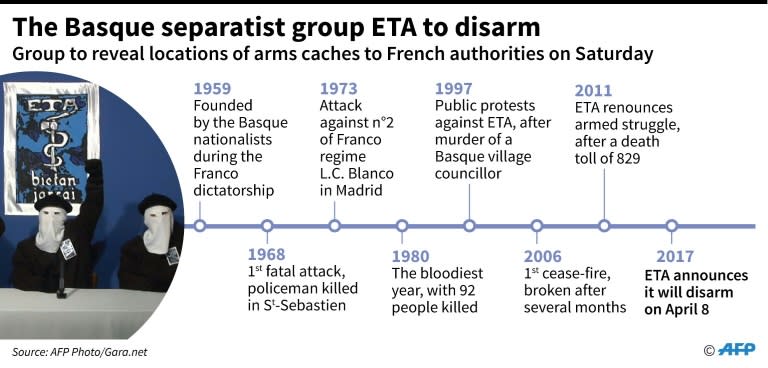Basque leader Otegi sees hope for independence as ETA disarms
A veteran leader of the pro-independence movement in the Basque Country who was once part of the armed separatist group ETA, Arnaldo Otegi cuts a controversial figure. For some in Spain, his involvement with a group that killed 829 people in its four-decade campaign for independence is unforgivable. Others, though, give him credit for helping to move ETA away from violence. In 2011, the group announced a "definitive" ceasefire and in its latest step says it will completely disarm. On Saturday, ETA handed French authorities a list of caches that it had said would hold all its remaining weapons. In an interview this week in Spain's Basque seaside city of San Sebastian, Otegi -- released from jail last year after serving time for trying to resurrect the outlawed separatist party Batasuna -- welcomed the disarmament move. The 58-year-old also insists that independence for his Basque homeland remains very much on the cards... via peaceful means this time. - Disarming in restive Europe - Qualifying ETA's disarmament as a "historic event," Otegi argued that the fact that an armed group was laying down its weapons at a time when Europe was wracked by jihadist attacks was significant. Madrid has so far given short shrift to an event that could help bring the curtain down on a painful part of Spain's recent history. The government has dismissed the disarmament as a unilateral affair and bluntly warned that the group -- which it denounces as a terror organisation -- can expect nothing in return. Otegi would not be drawn into whether he thought ETA may or may not disband after laying down its weapons. "I think ETA will have to start a debate among its militants about its future," he said. But his eyes -- like those of many Basques -- are turned to the future and how to mend divisions after years of killings and fear. And on that subject, he is optimistic. "We didn't have the problem that Ireland had for example, with the existence of two communities, this never existed," he said. "Here people who had totally different points of views lived in the same building," he said, referring to people who were ETA sympathisers and those who were victims of the group, bumping into each other in the stairwell or at the baker's. For that reason, he believes it may be easier for the Basque Country to heal. - Personal healing - There are several initiatives at work in the region to try to turn the page on years of violence, one of which is staging meetings between ETA victims and former members of the separatist group. Otegi himself is of the latter, having once served prison for a kidnapping, and then turned to ETA's political wing Batasuna, which was subsequently banned. In 2006, he was one of the main architects of peace negotiations between ETA and the Spanish government, which broke down. Since 2013, he has headed up Sortu, a party that campaigns for independence. He said he had met with three former victims over the past few months -- an experience he encouraged. "It's powerful, it's a really difficult experience on a human level but also very constructive," he said. - Independence - Still, Basque nationalists have not given up on independence. Otegi believes his region -- or "country" as he calls it -- will go the same way as Catalonia in the northeast, which is ruled by a pro-independence coalition that plans to stage a referendum in September, with or without Madrid's consent. "There will be a debate here on sovereignty," he said. "I think that we Basques are walking towards the construction of a European state."




